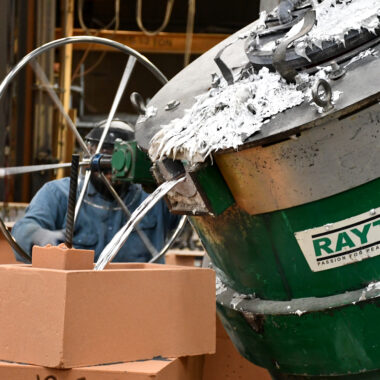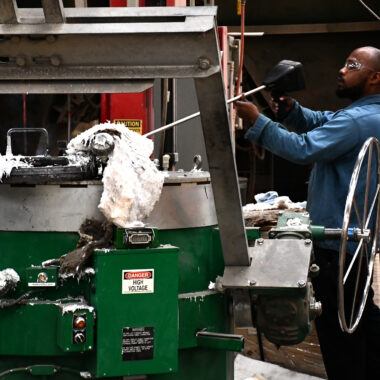Elevate Your Craft: Advanced Techniques for Casting Aluminum Illinois
Elevate Your Craft: Advanced Techniques for Casting Aluminum Illinois
Blog Article
Achieving Quality in Light Weight Aluminum Casting: Crucial Advice
In the realm of aluminum accuracy, top quality and spreading are vital (casting aluminum illinois). The procedure of transforming molten light weight aluminum right into intricate and resilient parts needs a thorough strategy at every stage. From meticulously selecting the best materials to sharpening putting methods and guaranteeing careful ending up touches, accomplishing excellence in aluminum casting demands a blend of knowledge and interest to detail. As practitioners in the area make every effort to excellent their craft, understanding a set of essential tips and tricks becomes essential. Allow's discover the crucial elements that can boost light weight aluminum casting from excellent to exceptional, establishing the phase for unequaled outcomes and unparalleled craftsmanship.

Products Choice
Picking the suitable materials is extremely important in ensuring the success and top quality of your light weight aluminum casting tasks. The choice of materials substantially influences the last residential properties of the casted items, consisting of toughness, resilience, and overall top quality. When picking products for light weight aluminum spreading, it is critical to consider elements such as the sort of aluminum alloy, the wanted mechanical properties, and the casting method being made use of.
Light weight aluminum alloys are generally used in spreading as a result of their light-weight nature and exceptional mechanical residential properties. The choice of the specific alloy depends on the application needs, with choices ranging from high-strength alloys appropriate for structural components to corrosion-resistant alloys for aquatic atmospheres. Understanding the attributes of various aluminum alloys is essential for picking one of the most proper one for your task.
Furthermore, the casting approach employed, whether it be sand casting, die casting, or investment spreading, also affects product option. Each casting method has its very own demands in terms of product fluidity, thermal conductivity, and mold compatibility. By thoroughly considering these aspects, you can guarantee that the products picked are customized to meet the certain needs of your light weight aluminum casting task.
Mold Prep Work
In the realm of light weight aluminum casting, the meticulous prep work of mold and mildews stands as an important precursor to the actual casting procedure. Mold preparation entails several necessary steps to make sure the quality and accuracy of the final actors product. It is essential to clean up the mold and mildew extensively to remove any type of dust, deposit, or previous casting residues that can endanger the new actors. This cleaning process helps preserve the honesty of the mold and mildew and protects against defects in the final product.
Following, using an ideal mold finish is essential to promote the release of the actors light weight aluminum and boost the surface area coating of the component. The sort of finishing utilized will depend on factors such as the complexity of the mold, the wanted surface area coating, and the casting product. Additionally, correct airing vent and gating systems should be incorporated into the mold design to enable the smooth circulation of liquified aluminum and avoid the he has a good point formation of air pockets or issues in the actors part.
Melting and Putting Strategies
To attain effective aluminum spreading, mastering effective melting and pouring strategies is vital for guaranteeing premium and accurate outcomes. The melting procedure is a critical step in aluminum casting, where the steel is heated up to its liquid state. It is important to monitor the temperature level closely to avoid overheating, which can cause poor casting top quality. Using induction furnaces or gas-fired crucible furnaces can give precise temperature level control and efficient melting.
Once the light weight aluminum gets to the preferred liquified state, proper pouring techniques need to be employed to transfer the steel into the mold and mildews. The speed and uniformity of the put are essential aspects in accomplishing uniform filling of the mold tooth cavity and lowering the danger of defects like air entrapment or incomplete casting. Gravity putting, low-pressure spreading, or centrifugal spreading techniques can be made use of based upon the specific requirements of the project.
Cooling and Solidification Control
Accomplishing specific control over the air conditioning and solidification procedure is crucial in light weight aluminum casting to maintain the integrity and quality of the final casted items. Correct cooling and solidification control help prevent defects such as porosity, warm splits, and shrinkage that can compromise the mechanical residential or commercial properties of the casted light weight aluminum components.
One important facet of cooling and solidification control is the style and positioning of cools. Cools are metal things purposefully put in the mold to absorb heat quickly from details locations of the spreading, promoting uniform solidification and decreasing the probability of flaws. Furthermore, managing the cooling rate by changing the mold's material, layout, and the application of shielding layers can affect the microstructure and mechanical properties of the last spreading.
Additionally, monitoring and managing the air conditioning process with the use of important link thermocouples and computer system simulations permit real-time adjustments to maximize cooling prices and solidification patterns. By carrying out these methods, shops can boost the high quality and uniformity of their light weight aluminum castings, fulfilling the strict demands of various sectors.
Finishing and Top Quality Examination
Effectively content implemented completing and top quality examination procedures are important in ensuring the general integrity and dependability of aluminum spreadings, building upon the careful cooling and solidification control strategies used throughout the casting process. Ending up techniques such as grinding, fining sand, and brightening aid eliminate excess product, smooth rough surfaces, and enhance the castings' last look. These processes not just boost the aesthetic allure but likewise make certain dimensional accuracy and functionality.

Final Thought
In verdict, achieving quality in aluminum spreading needs mindful consideration of products option, precise mold preparation, exact melting and putting methods, reliable cooling and solidification control, as well as thorough completing and top quality inspection processes. By adhering to these necessary tips and techniques, suppliers can ensure the production of high-grade aluminum castings that fulfill industry standards and customer assumptions.
When selecting products for light weight aluminum spreading, it is important to take into consideration variables such as the kind of aluminum alloy, the preferred mechanical buildings, and the spreading method being used.
Furthermore, the spreading approach used, whether it be sand spreading, pass away spreading, or investment casting, also influences material selection.In the realm of light weight aluminum casting, the meticulous preparation of molds stands as a vital forerunner to the real spreading process. Gravity pouring, low-pressure casting, or centrifugal casting approaches can be utilized based on the particular requirements of the job.

Report this page